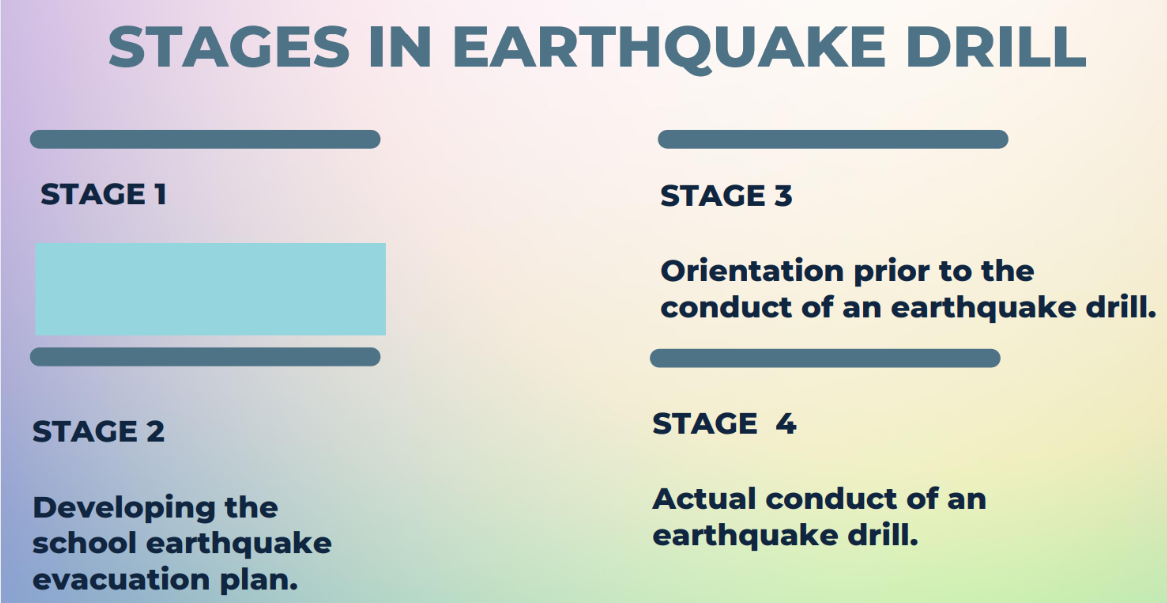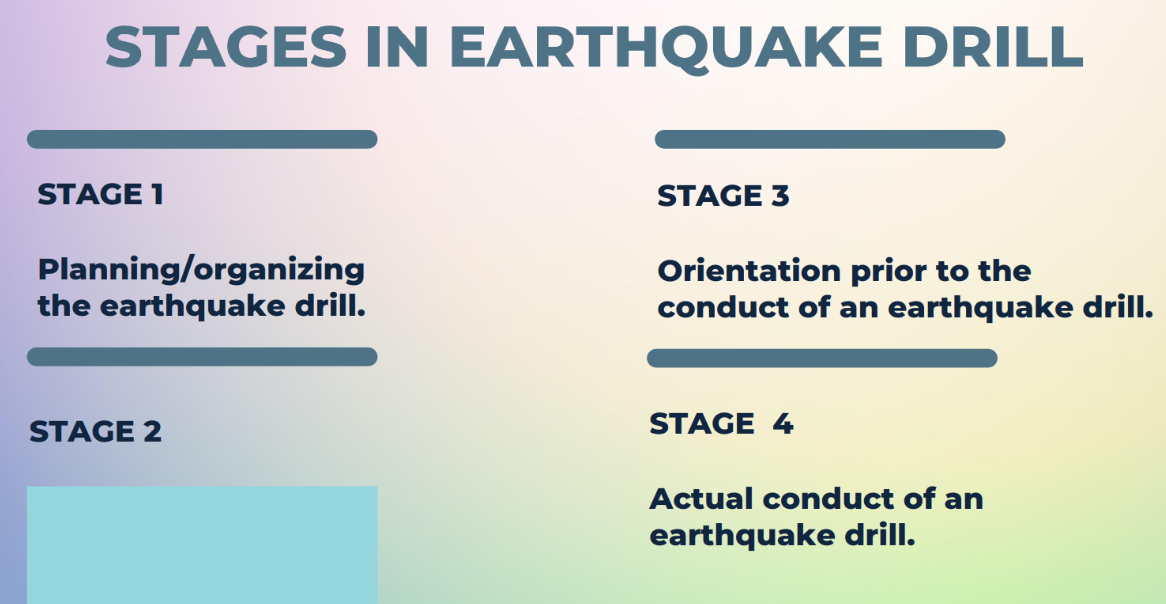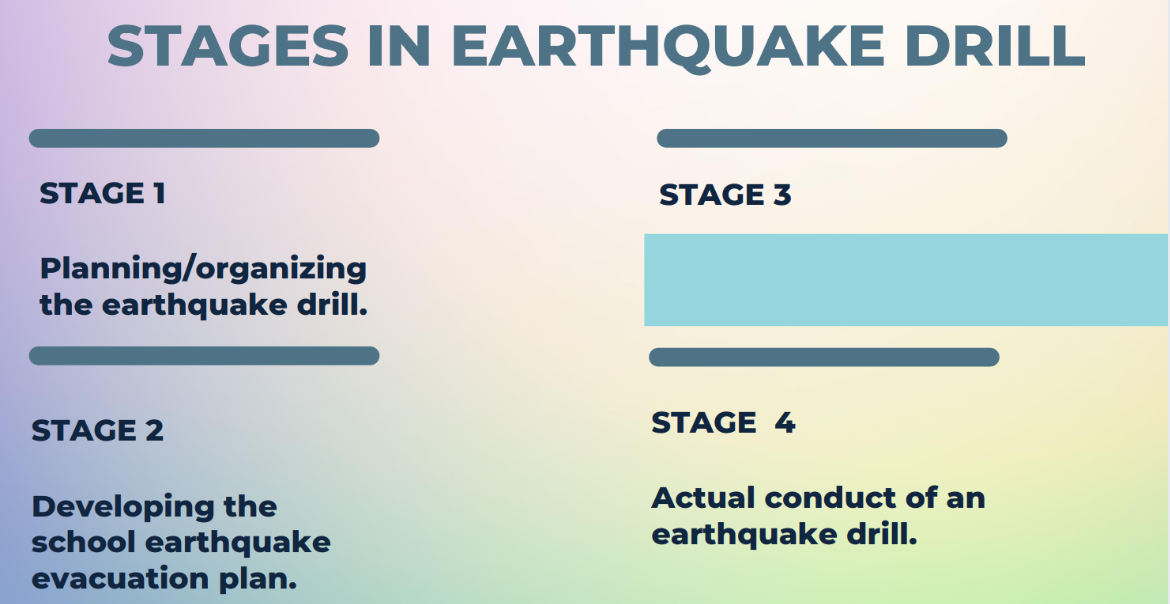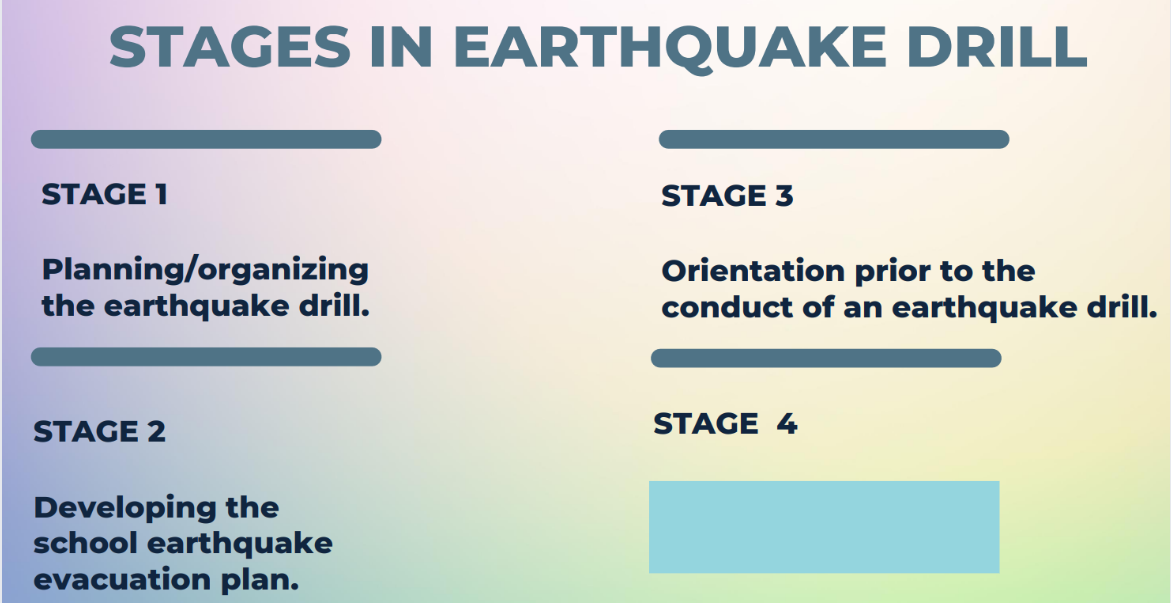Week 1 & 2 Dealing with Earthquake Hazards in SCHOOL
1/20
There's no tags or description
Looks like no tags are added yet.
Name | Mastery | Learn | Test | Matching | Spaced |
|---|
No study sessions yet.
21 Terms
Drills
Should always be treated as real emergency
Planning/organizing the earthquake drill

Developing the school earthquake evacuation plan

Orientation prior to the conduct of an earthquake drill

Actual conduct of an earthquake drill

School Disaster Management Committee (SDMC)
Composed of several teams with specific tasks, includes:
Overall Coordinator (School DRRM FC)
First Aid Team
Site Security Team
Fire-Safety Team
Evacuation Team
Communications Team
Prepare Earthquake Survival Kit
Basic items inside this kit:
First Aid Kit (Alcohol, bondage, absorbent cotton, gauze, masks, adhesive plasters, medicines & tweezers)
Food, Bottled water, Flashlights & extra batteries, radio (battery operated), Lighters & matches, whistle, Knife, Blankets & spare clothes, Rope – at least 7 meters long, Toiletries, Pen & paper, emergency contact numbers, cash.
Phase 1 - Alarm
During the drill, the 1-minute alarm indicates
earthquake or shaking.
Phase 2 - Response
While the alarm is on-going, everyone should perform “duck, cover, and hold". Remain in this position until the “shaking stops."
Take cover under a sturdy table and hold to your cover until the shaking stops
Use book to cover your head
Hide under an armchair
Phase 3 - Evacuation
10 seconds to LOOK AROUND! As soon as the shaking stops, immediately evacuate the school building and proceed to the identified evacuation areas using the pre-determined routes guided by the class marshal or teacher.
Get out of the building in an orderly manner
Give the following instructions to students/pupils:
Walk, Do Not Run, Do Not Push, Do Not
Talk
Proceed to the identified evacuation area
Duck, Cover and Hold
DUCK down to the floor
Take COVER under a sturdy table or desk
HOLD on to it and be prepared to move with it.
Good practices and safe zones
• Swing out door
• Wide corridors
• Wide open space for evacuation
• Fire exits
• Public alarm system
Some of the unsafe zones
Windows and glass panes
Book shelves, machinery, cabinets and furniture that may topple of slide
Narrow alleys
Passing near water tank
After identifying the safe and unsafe spots, the next step is to develop the School Earthquake Evacuation Plan.
• Use all available OPEN SPACES nearest to
the building/school
• Determine if there is sufficient open space
for all. Areas to be occupied should be
computed assuming 4 to 5 students would
occupy 1 sq. m. area.
• Consider the number of pupils in each
building per session
• Make sure that evacuation route will not
expose the pupils/students to additional
hazards
• Assigned each class a specific
designated evacuation area
• Come up with evacuation procedure using
the available map. School Earthquake Evacuation Plan.
Preparations
1. Conduct of lectures about earthquake
2. Conduct classroom hazard observation
activity
3. Introduce evacuation plan
4. Introduce assigned evacuation area
5. Post the school evacuation map in every
classroom and bulletin board
6. Assigned pupil/student in-charge of
making sure the door is open during
shaking
7. Assign observers and evaluators who will
give comments and suggestions
8. Inform the neighborhood about the drill
9. Check available alarm system
10. Assign class marshal
11. Take note of persons with disabilities
(PWD), pregnant and elderly and identify
their locations for evacuation
12. Assign marshals to assist the PWD,
pregnant and elderly during evacuation
Phase 4 - Assembly
At the designated evacuation area, pupils
must be grouped together according to the class
where they belong.
Phase 5 - Head count
Teacher should check and make sure all
pupils are accounted for.
Phase 6 - Evaluation
The overall coordinator will announce the termination of the drill or "All clear"
An evaluation of the drill must be conducted to identify problems encountered during the drill and how these problems can be improved in future earthquake drills.
Observers will give their comments and suggestions when all are gathered in the evacuation areas
Where are you?
One whistle blow means
Come to me
Two whistle blow means
I need help
Three whistle blow means